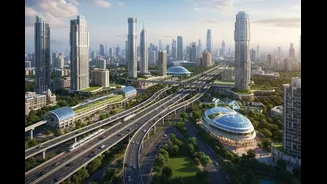The Rural Renaissance
The economic narrative of India is evolving, moving beyond the established metropolitan centers to embrace the prosperity unfolding in smaller towns. An
influx of cash has empowered these communities, shifting the financial dynamics of the nation. Small-town residents, fueled by rising incomes and new opportunities, find themselves navigating unfamiliar territory as they search for strategies to handle their increasing wealth. This transition is driven by factors such as growth in local businesses, the expansion of financial services, and increasing government initiatives aimed at rural development. This shift marks a pivotal moment, as it reveals how the economic fabric of India is being rewoven, with implications extending from household spending patterns to the larger national economy.
Sources of Income
The financial uptick in smaller towns is a result of varied income streams. Many are seeing an increase in disposable income due to better returns from agriculture, with the rising price of agricultural products, coupled with improvements in farming techniques, empowering farmers to earn more. Alongside this, the rise in entrepreneurship has become a driving force. Small businesses, from local retailers to service providers, are growing, fueled by increased local spending. Furthermore, various government schemes and subsidies are designed to provide financial stability to residents. These programs give direct support and create employment opportunities that contribute to an increase in wealth among the inhabitants. This diversified base strengthens the economic position of the towns and gives residents financial opportunities.
Spending Patterns Evolve
As wealth increases in smaller towns, changes in spending habits are naturally occurring. The population is gradually moving beyond mere essential purchases, allocating funds to improve their quality of life. There is increased demand for consumer goods, ranging from durable appliances and vehicles to lifestyle products. Investment in education and healthcare is also on the rise. This shift reflects a desire for improved access to higher quality services. Additionally, entertainment and leisure activities are becoming more prevalent, indicating a shift towards a more consumer-driven lifestyle. This transition in spending habits highlights the growing economic empowerment of the local residents, influencing the structure of the local markets and boosting economic activity. This change is also encouraging businesses to adapt and provide products and services that cater to the changing needs of the local customers.
Investment Strategies
As small-town residents become wealthier, many are beginning to seek effective ways to manage and invest their money. There's a growing interest in financial instruments like fixed deposits, mutual funds, and even real estate, reflecting a desire to secure long-term financial gains. However, a lack of financial literacy poses a major challenge. Many people in these towns are unfamiliar with various investment products, causing them to rely on local advice. Educating the population about financial planning, risk management, and investment diversification becomes crucial. Various financial literacy programs and initiatives are being implemented to support them. Increased financial literacy helps ensure that the people of small towns can make well-informed investment decisions and improve their financial stability and growth.
Challenges and Opportunities
While the rise in wealth in small towns offers many opportunities, it also presents various challenges. Infrastructure development remains a concern, as the existing infrastructure might not be sufficient to support the increase in economic activity. The need for improvement in connectivity, transportation, and utilities is substantial. The lack of proper financial infrastructure, including access to banking services and digital payment systems, also hinders economic growth. The government is developing various initiatives to boost infrastructure and improve financial services. Another challenge lies in ensuring sustainable growth and environmental protection. As economic activity rises, there is an increased focus on waste management, pollution control, and preserving the environment. By proactively addressing these challenges, small towns can capitalize on the opportunities that come with rising wealth, thus fostering sustainable and equitable growth.
Future Prospects
The future of India’s small towns looks promising, with the potential for continuous economic growth and improvement in living standards. The ongoing initiatives to boost infrastructure, coupled with increased access to financial services and rising awareness about financial planning, will play key roles in fostering this growth. The integration of technology will also be a key factor. Digital payment systems, e-commerce platforms, and online education will have a transformative effect on the economy and social structures. Furthermore, increasing urbanization and migration from large cities to small towns are likely to drive population growth and boost local markets. For the residents of small towns, the future is promising, provided they navigate their new financial landscapes with smartness, sound planning, and a commitment to sustainable growth.













